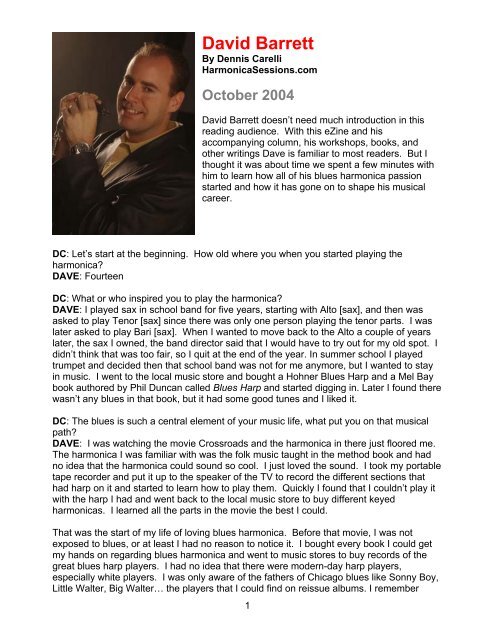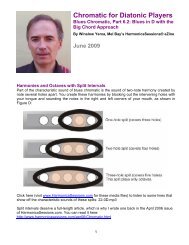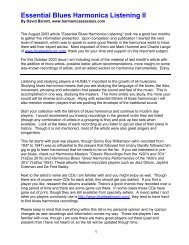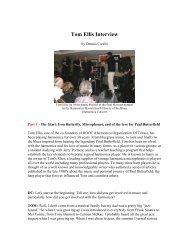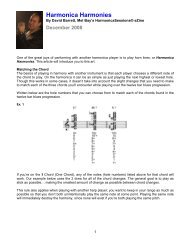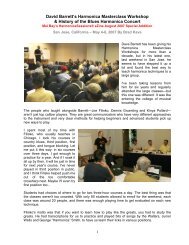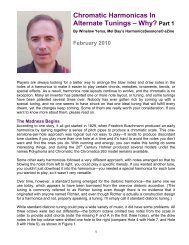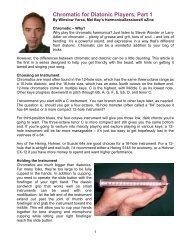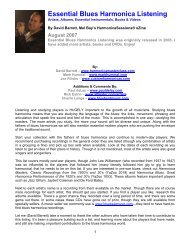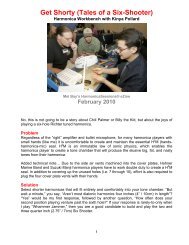David Barrett - Mel Bay's Harmonica Sessions
David Barrett - Mel Bay's Harmonica Sessions
David Barrett - Mel Bay's Harmonica Sessions
Create successful ePaper yourself
Turn your PDF publications into a flip-book with our unique Google optimized e-Paper software.
<strong>David</strong> <strong>Barrett</strong><br />
By Dennis Carelli<br />
<strong>Harmonica</strong><strong>Sessions</strong>.com<br />
October 2004<br />
<strong>David</strong> <strong>Barrett</strong> doesn’t need much introduction in this<br />
reading audience. With this eZine and his<br />
accompanying column, his workshops, books, and<br />
other writings Dave is familiar to most readers. But I<br />
thought it was about time we spent a few minutes with<br />
him to learn how all of his blues harmonica passion<br />
started and how it has gone on to shape his musical<br />
career.<br />
DC: Let’s start at the beginning. How old where you when you started playing the<br />
harmonica?<br />
DAVE: Fourteen<br />
DC: What or who inspired you to play the harmonica?<br />
DAVE: I played sax in school band for five years, starting with Alto [sax], and then was<br />
asked to play Tenor [sax] since there was only one person playing the tenor parts. I was<br />
later asked to play Bari [sax]. When I wanted to move back to the Alto a couple of years<br />
later, the sax I owned, the band director said that I would have to try out for my old spot. I<br />
didn’t think that was too fair, so I quit at the end of the year. In summer school I played<br />
trumpet and decided then that school band was not for me anymore, but I wanted to stay<br />
in music. I went to the local music store and bought a Hohner Blues Harp and a <strong>Mel</strong> Bay<br />
book authored by Phil Duncan called Blues Harp and started digging in. Later I found there<br />
wasn’t any blues in that book, but it had some good tunes and I liked it.<br />
DC: The blues is such a central element of your music life, what put you on that musical<br />
path?<br />
DAVE: I was watching the movie Crossroads and the harmonica in there just floored me.<br />
The harmonica I was familiar with was the folk music taught in the method book and had<br />
no idea that the harmonica could sound so cool. I just loved the sound. I took my portable<br />
tape recorder and put it up to the speaker of the TV to record the different sections that<br />
had harp on it and started to learn how to play them. Quickly I found that I couldn’t play it<br />
with the harp I had and went back to the local music store to buy different keyed<br />
harmonicas. I learned all the parts in the movie the best I could.<br />
That was the start of my life of loving blues harmonica. Before that movie, I was not<br />
exposed to blues, or at least I had no reason to notice it. I bought every book I could get<br />
my hands on regarding blues harmonica and went to music stores to buy records of the<br />
great blues harp players. I had no idea that there were modern-day harp players,<br />
especially white players. I was only aware of the fathers of Chicago blues like Sonny Boy,<br />
Little Walter, Big Walter… the players that I could find on reissue albums. I remember<br />
1
having an argument with my uncle one night when he said there was a killer white harp<br />
player he saw in a club the other night. I proceeded to argue with him that there were no<br />
white harp players! It’s funny to think of that now, but I was a kid.<br />
I guess my learning was a bit backwards compared to most players today. Many of my<br />
students say that “Whammer Jammer” by Magic Dick or “Room To Move” by John Mayall<br />
or some other song influenced them to play. They learned the white players first and later<br />
discovered the black originators of the music.<br />
I bought most my records from the Lost Mine Antiques store in the town I lived in at the<br />
time, Morgan Hill. I stop by after school on a regular basis and asked what has come in<br />
that had blues harmonica on it. He had a lot of records. Sometimes he would recommend<br />
something real good and sometimes there was no harp on it at all. That would upset me,<br />
because you don’t have much money when your fourteen years old. Allowance only goes<br />
so far!<br />
Every weekend I would record the blues shows from the radio. KKUP would play blues<br />
from midnight to something way past what I could stay up. I would hit “record” on a ninetyminute<br />
tape at midnight and turn it over right before I would fall asleep. I would set my<br />
alarm for forty minutes later so that I could put another tape in. The next morning I would<br />
comb through the tapes for harp songs and work on them through the day. This would<br />
repeat for Saturday and Sunday. Needless to say, I didn’t get a lot of sleep on the<br />
weekends.<br />
To get back to the point—I studied all the fathers of blues harmonica first, because that’s<br />
all I was aware of. It wasn’t until I studied under Gary Smith that I learned there were a<br />
whole slew of great players carrying on the tradition.<br />
DC: Speaking of Gary Smith, how did you meet him and how old were you when you<br />
started to study with him?<br />
DAVE: I won a pair of tickets on a radio contest to a JJ’s Blues Festival when I was<br />
sixteen. Gary Smith played and my jaw dropped to the ground. I was awe struck. I<br />
noticed that the artists would go out the side gate from the artist area to pick up their free<br />
BBQ chicken. I waited for Gary after his set and asked him. He first said no, but I told him<br />
that I would be serious and really wanted to learn. He said yes. My mom worked out a<br />
deal with me that she would pay half of the cost of the lessons and drive me there.<br />
Gary taught me everything I needed to be a proficient blues player. He taught me how to<br />
control bends, play [Paul] Butterfield type licks, vibrato, tongue blocking—he taught me a<br />
lot. I worked real hard after each lesson and came back able to play what he taught me.<br />
He also took me to my first performance, at JJ’s Blues in San Jose. I have the picture of<br />
us playing together hanging in the studio at my school.<br />
I took lessons with him for seven months. I should have stayed a lot longer, but I was<br />
young and thought I learned from him what I could.<br />
I still play on occasion with him. I’ll be playing the San Francisco Blues Festival with him in<br />
a couple weeks. It feels good to be playing the shows I saw when I was a kid. I never<br />
dreamed I’d be playing the same stages. He is one of the reasons why I teach. If I didn’t<br />
2
have his guidance, I wouldn’t be where I am today. I like to think I’m that way for my<br />
students.<br />
DC: Do you play/perform with other instruments besides the harmonica?<br />
DAVE: In college I studied and learned how to play pretty much every instrument. I use<br />
bass and piano on a regular basis with my students, occasionally guitar or drums. I don’t<br />
play any of them well enough to gig.<br />
DC: Any other musicians in your family?<br />
DAVE: My mother sang, played guitar and piano. My brother played trumpet in school.<br />
My father played the record player. My wife is a wonderful singer from Japan. We met<br />
while she was in the US studying Jazz voice. She left a career in Japan to live in the US<br />
when we got married. When my son is old enough and she has more free time, maybe<br />
she will sing again.<br />
DC: Who are the artists that had the largest influence on you as a player? Historical?<br />
Contemporary?<br />
DAVE: Everybody! I studied anyone who blew harp. I still do.<br />
DC: When did you start teaching?<br />
DAVE: I was going to college as a music major and thought doing private teaching would<br />
be a great way to earn money for school. I was eighteen then. I wish I could have all my<br />
first year students back. That was such a learning curve. There really were no serous<br />
method books on the market, so I spent more time at home writing material for students<br />
than in the teaching seat. That’s what started a life-long pleasure of writing instruction<br />
books for blues harmonica. I taught at three music stores at that time. One of them was<br />
Showcase Music Institute. That was a cool place. We were required to teach two<br />
workshops each month. One I did a jam session with a fellow instructor and the other I did<br />
a technique series. Each month I worked hard on presenting a specific technique to the<br />
students. After a year, that gave me the basis for my first book with <strong>Mel</strong> Bay Publications,<br />
Building <strong>Harmonica</strong> Technique. I finished that book and published it at age twenty.<br />
DC: When did you take the “bold” step and decide to become a full-time blues musician?<br />
DAVE: I’ve been a full-time harmonica teacher since I was eighteen. There were periods<br />
of heavy study in college and the six years of running a music store (The Music Tree) that<br />
took a lot of time, but being a great blues harmonica educator has always been my goal. I<br />
perform fairly regularly, but my focus is clearly on instruction. That’s what I do best and<br />
have a thirst to do better every day.<br />
In January of 2000 I left the Music Tree to run the <strong>Harmonica</strong> Masterclass Company,<br />
private teaching and writing full time. That was also the month my son was born. It was<br />
the beginning of two great things, not to exclude my beautiful and supportive wife, Nozomi.<br />
I opened School of the Blues in San Jose in 2002.<br />
DC: What brand of harps do you usually use?<br />
DAVE: I use Joe Filisko customized Hohner Marine Bands. I also use HarpSmith<br />
customized Hohner Special 20’s. Lee Oskar model harps are also fine harmonicas; I use<br />
them when I need a special tuned harp.<br />
3
DC: What microphones do you usually use?<br />
DAVE: I usually use a smaller Shure bullet mic (from the 40’s) with a black-label Controlled<br />
Reluctant Shure element.<br />
DC: And the amp?<br />
DAVE: The new Sonny Jr. 4x10. It’s a 1959 Fender Bassman style amp with all the<br />
goodies to make it sound killer for harp.<br />
DC: What amps did you use in your first studio recording?<br />
DAVE: A Fender Princeton Reverb (1967-1972 model) and a reissue 1959 Fender<br />
Bassman, modded by Sonny Jr.<br />
DC: What amp and mic do you recommend for a beginning player?<br />
DAVE: The Fender Blues Jr. is a nice inexpensive amp with a Shure green bullet mic<br />
(520DX). Vintage gear is great, but you kind of have to know about them before you buy.<br />
Pre 1982 Fender Princeton amps I feel are great amps for most small-room situations.<br />
The Fender Bassman is a great gigging amp. The older Shure Controlled Magnetic or<br />
Controlled Reluctant elements are real nice with these amps, with any body that’s<br />
comfortable. If someone is interested in vintage mics, I send them to Fritz Hasenpusch,<br />
Tom’s Mics or Sonny Jr.<br />
DC: You play a lot with John Garcia, how and when did you first meet up with him?<br />
DAVE: I first met John when I was eighteen years old. I did a demo with a guitar player I<br />
went to school with by the name of Shane Dwight. He still plays blues. Shane was taking<br />
lessons from John at the time and recommended that we have John listen to it and tell us<br />
what he thought. I knew he taught a guitar class at the local high school. I waited for him<br />
one night and approached him about listening to the tape.<br />
Many years later when I started to manage the Music Tree in Morgan Hill I was doing a lot<br />
of booking for various Bay Area events. I started booking John, and on occasion sitting in<br />
with him. He was, and is, always good about having people sit in with him. I would sit in<br />
when he did a solo act and sometimes when he played with his band.<br />
The first time we formally worked together was a local event called the Friday Night Music<br />
Series in Morgan Hill. I booked it under my name with John’s band, even though we had<br />
never played a show together. I went to one of his shows and recorded the evening, with<br />
his permission of course. I later went through the tunes and chose the ones I liked and<br />
made a set list. It was a great idea and worked out well. It was like we rehearsed together<br />
many times before the show, but it was really me just practicing to their songs I recorded<br />
and giving them a set list of their tunes! The gig went smooth and we did more gigs after.<br />
We have since worked together often, especially after I opened the School of the Blues.<br />
We formed the School of the Blues All Stars with Kevin Coggins on drums, Frank De Rose<br />
on bass, Steve Czarnecki on keyboards. All these players have been long-time blues<br />
musicians in my area. John and I also recorded an album together in 2003, my first.<br />
DC: As a harmonica player, what strikes you about playing with John?<br />
DAVE: He has studied all the guitar players through time and really knows how to back a<br />
harp player. He plays harp himself, so he knows what it’s capable of. He’s a real student<br />
of accompaniment playing, not just soloing. John also doesn’t stop at blues from the 50’s,<br />
he covers any era of blues that grabs him. Though I feel more at home with the earlier<br />
4
stuff, playing other types of blues has helped to stretch my knowledge and become a more<br />
well rounded player. My ability to play like a horn or organ player is a good example that<br />
developed by playing with John. I’m very lucky to play with him. He’s been a sort of a<br />
mentor as well as a musical partner.<br />
DC: You have had an opportunity to play with a lot of great musicians as you part on your<br />
annual workshops. What harmonica players do you strongly remember? What other<br />
musicians?<br />
DAVE: I enjoyed working with them all so much, I would need a couple hours to speak all<br />
the good things about each artists. Overall, it’s just great to be around other players that<br />
are so passionate about blues and the harmonica. Lee Oskar has been very helpful<br />
through the years. I got to work with the very players I was studying so hard years before.<br />
A dream-come-true to a certain degree.<br />
DC: Is there a particular event that you would single out as being most memorable?<br />
DAVE: The Legends of the Blues <strong>Harmonica</strong> concerts we used to do stick out as being<br />
very memorable to me. Participating in Mark Hummel’s blow out shows are also very<br />
memorable.<br />
DC: How much preparation/arranging did you do for your recording?<br />
DAVE: We did one rehearsal with the guys I hired. We then recorded in the studio for<br />
about four hours. John and I tracked our solos later. All of my tunes were originals, so<br />
they were worked out pretty well ahead of time.<br />
DC: How much “room” do you leave yourself and the other musicians for inspired<br />
moments in the studio?<br />
DAVE: I give the musicians a general direction and form. What they do is up to them to<br />
make it sound good. In rehearsal each player added to the song if they had a good idea.<br />
DC: For your instrumental tunes, how much of the playing is pre-written?<br />
DAVE: Being my first album, I pretty much worked out everything ahead of time. I wanted<br />
to play it safe. My next album I’ll work out the heads and improvise everything else, like I<br />
do when I play live.<br />
DC: Can you share any “secrets” that you use for your recording sessions’ setup?<br />
DAVE: Before I went into the studio a spoke to Mark Hummel and Gary Smith. They both<br />
recommended using two amps at the same time and different mics to capture different<br />
tone. One mic right in front of the amp, one about two to three feet away and one behind<br />
the amp. We spent a lot of time on dialing in the harp tone.<br />
DC: What helpful words of advice would you give a beginning player?<br />
DAVE: Follow my books carefully and try to hook up with a local harp teacher. If there<br />
aren’t any in your area, fly in and work with me at a workshop or at the school in San Jose.<br />
DC: An intermediate player?<br />
DAVE: Same answer as the question before with the addition of how important it is to<br />
memorize great harmonica songs and to play licks with jam tracks to make sure they can<br />
place into context what they learn. Technique is of course an important area of study.<br />
5
DC: An advanced player?<br />
DAVE: Same answers as the questions before with the addition of how important it is to<br />
play often with other players. I work hard to hook up my better players with other students<br />
at the school. For many strong players, playing in a band or a duo is the only way they’ll<br />
get the motivation to move to the next step in their musicianship.<br />
DC: How about someone who wants to teach harmonica to others?<br />
DAVE: Study all the material available out there. I have teacher accreditation programs,<br />
so that’s, of course, an option.<br />
DC: Thanks Dave. I appreciate your setting aside some time to talk today and share a<br />
little more about your playing history and experience.<br />
DAVE: Your welcome.<br />
6


